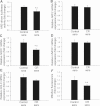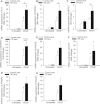Circulating factors induced by caloric restriction in the nonhuman primate Macaca mulatta activate angiogenic processes in endothelial cells
- PMID: 22904098
- PMCID: PMC3605906
- DOI: 10.1093/gerona/gls158
Circulating factors induced by caloric restriction in the nonhuman primate Macaca mulatta activate angiogenic processes in endothelial cells
Abstract
Moderate caloric restriction (CR) without malnutrition increases healthspan in virtually every species studied, including nonhuman primates. In mice, CR exerts significant microvascular protective effects resulting in increased microvascular density in the heart and the brain, which likely contribute to enhanced tolerance to ischemia and improved cardiac performance and cognitive function. Yet, the underlying mechanisms by which CR confer microvascular protection remain elusive. To test the hypothesis that circulating factors triggered by CR regulate endothelial angiogenic capacity, we treated cultured human endothelial cells with sera derived from Macaca mulatta on long-term (over 10 years) CR. Cells treated with sera derived from ad-libitum-fed control monkeys served as controls. We found that factors present in CR sera upregulate vascular endothelial growth factor (VEGF) signaling and stimulate angiogenic processes, including endothelial cell proliferation and formation of capillary-like structures. Treatment with CR sera also tended to increase cellular migration (measured by a wound-healing assay using electric cell-substrate impedance sensing [ECIS] technology) and adhesion to collagen. Collectively, we find that circulating factors induced by CR promote endothelial angiogenic processes, suggesting that increased angiogenesis may be a potential mechanism by which CR improves cardiac function and prevents vascular cognitive impairment.
Figures






 production in CAECs, assessed using the MitoSOX Red fluorescence method. Data are mean ± SEM. (n = 5 for each group).
production in CAECs, assessed using the MitoSOX Red fluorescence method. Data are mean ± SEM. (n = 5 for each group).


References
-
- Tarnawski AS, Pai R, Tanigawa T, Matysiak-Budnik T, Ahluwalia A. PTEN silencing reverses aging-related impairment of angiogenesis in microvascular endothelial cells. Biochem Biophys Res Commun. 2010;394:291–296 - PubMed
-
- Bach MH, Sadoun E, Reed MJ. Defects in activation of nitric oxide synthases occur during delayed angiogenesis in aging. Mech Ageing Dev. 2005;126:467–473 - PubMed
-
- Sadoun E, Reed MJ. Impaired angiogenesis in aging is associated with alterations in vessel density, matrix composition, inflammatory response, and growth factor expression. J Histochem Cytochem. 2003;51:1119–1130 - PubMed
-
- Ahluwalia A, Tarnawski AS. Activation of the metabolic sensor-AMP activated protein kinase reverses impairment of angiogenesis in aging myocardial microvascular endothelial cells. Implications for the aging heart. J Physiol Pharmacol. 2011;62:583–587 - PubMed
Publication types
MeSH terms
Substances
Grants and funding
- AT006526/AT/NCCIH NIH HHS/United States
- R01 AG037000/AG/NIA NIH HHS/United States
- R01 AG040178/AG/NIA NIH HHS/United States
- P01 AG011915/AG/NIA NIH HHS/United States
- P01 AG011370/AG/NIA NIH HHS/United States
- NS056218/NS/NINDS NIH HHS/United States
- AG038747/AG/NIA NIH HHS/United States
- P51 OD011106/OD/NIH HHS/United States
- R01 AT006526/AT/NCCIH NIH HHS/United States
- RR15459-01/RR/NCRR NIH HHS/United States
- R01 AG038747/AG/NIA NIH HHS/United States
- P01 AG11370/AG/NIA NIH HHS/United States
- RR020141-01/RR/NCRR NIH HHS/United States
- AG031085/AG/NIA NIH HHS/United States
- R01 AG026607/AG/NIA NIH HHS/United States

